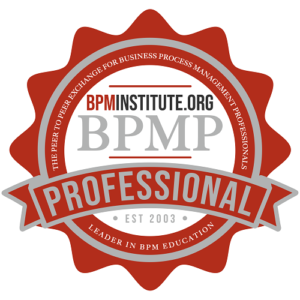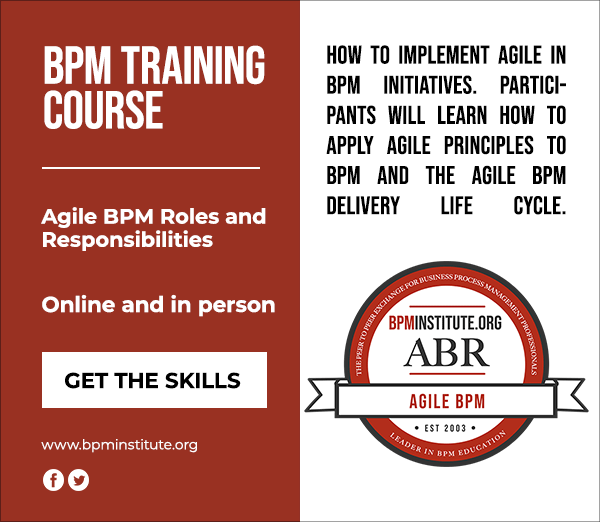Agile BPM Roles and Responsibilities – Face-to-Face
$1,195.00
The Agile BPM Roles and Responsibilities class focuses on how to implement agile in BPM initiatives. Participants will learn how to apply agile principles to BPM and the agile BPM delivery life cycle. In addition they will learn how to adapt roles in agile and how to setup process improvement work that delivers value more quickly to internal and/or external customers.
| Course Date | Standard Rate | Buy Before | Your Rate | Savings |
|---|---|---|---|---|
| Jun 10 '25 | $1,195.00 | May 11 | $1,095.00 | -$100.00 |
| Sep 16 '25 | $1,195.00 | Jul 18 | $895.00 | -$300.00 |
The Agile BPM Roles and Responsibilities class focuses on how to implement agile in BPM initiatives. Participants will learn how to apply agile principles to BPM and the agile BPM delivery life cycle. In addition they will learn how to adapt roles in agile and how to setup process improvement work that delivers value more quickly to internal and/or external customers.
Agile BPM Roles and Responsibilities provides the foundation for any BPM professional who wants to apply agile basics to Business Process Management. An increasing number of companies are finding that agile principles can be successfully applied to process improvement initiatives resulting in faster delivery of value to customers. This course teaches BPM professionals how to implement the agile methodology within their BPM program. Specific topics covered include agile BPM delivery life cycle, agile principles for BPM, project management in agile, and redefining agile roles for agile BPM. Exercises are interwoven into the lessons to provide hands-on practice and allow the students to discuss real-world implementation of the concepts learned. Whether you are a BPM analyst who is working with scrum teams or a leader who wants to use agile principles in your process improvement department, this class is for you.
Outline:
- Benefits of Utilizing Agile in BPM
- General BPM Stages
- Process Management Cycle
- Agile Principles for BPM
- Traditional Agile Roles
- Agile BPM roles
- Responsibilities for Agile BPM Roles
- Organizing Your BPM Work for Agile
- Understand how to apply agile to process improvement.
- Understand how to apply agile to process management.
- Implement user story mapping to decompose work and find MVP.
- Practice turning user story map into epics, features, and user stories
- Learn three approaches for applying agile to your BPM initiatives.
- Learn how to organize BPM initiatives for delivering value more frequently.
- Successfully position the BPM practitioner within the agile space.
- Explain skills and characteristics needed by BPM practitioners in agile.
Agile BPM Roles and Responsibilities presents actionable insights into how to implement agile in your BPM program including creating new roles for agile teams. Participants will learn how to setup BPM work to best deliver value more frequently as well as how to effectively organize agile teams for their different BPM initiatives.
-
- BPM Analysts
- Process Analysts
- Scrum Team Members
- Business Architects
- BPM Leaders
- Managers in any of these areas
Whether your BPM analysts are working directly with agile scrum teams or advising agile scrum teams, this course will explain agile BPM roles and responsibilities to allow them to better understand and contribute to your agile teams.
 The BPMS Certificate is the perfect way to show employers that you are serious about business process management. With in-depth knowledge of process improvement and management, you’ll be able to take your business career to the next level.
The BPMS Certificate is the perfect way to show employers that you are serious about business process management. With in-depth knowledge of process improvement and management, you’ll be able to take your business career to the next level.
 Tell the world that you are serious about business process management. Let your résumé feature your in-depth knowledge of process improvement and management. You’ll gain competitive advantage and open up opportunities down the road.
Tell the world that you are serious about business process management. Let your résumé feature your in-depth knowledge of process improvement and management. You’ll gain competitive advantage and open up opportunities down the road.
















